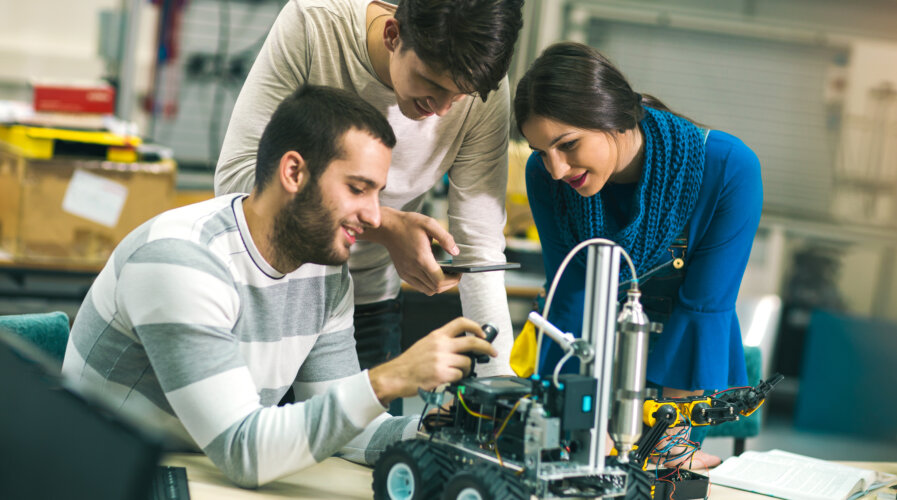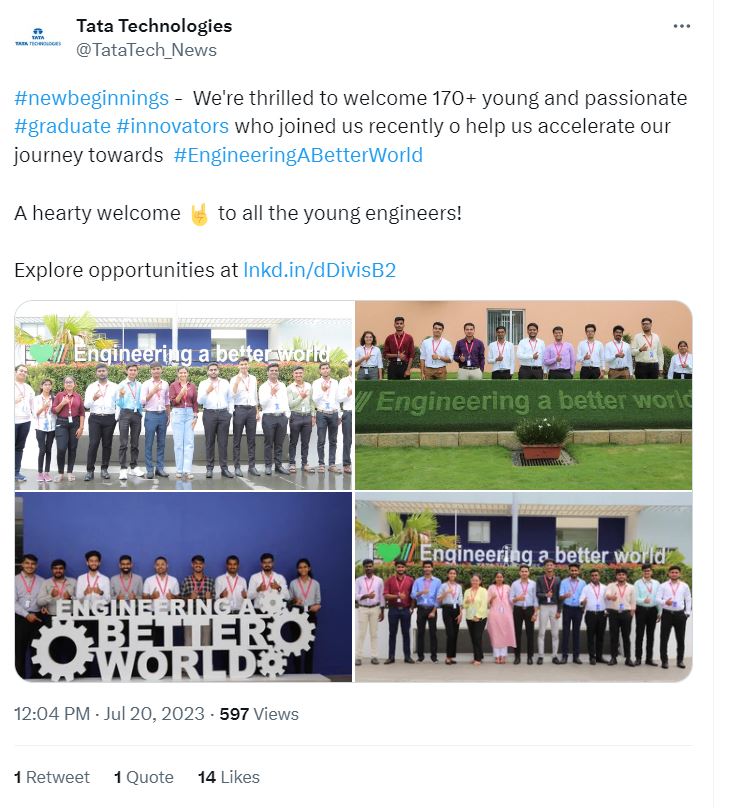
India is hoping to train more students to solve the challenges faced in the manufacturing industry. (Image – Shutterstock)
For the manufacturing industry, innovative solutions come with a price
|
Getting your Trinity Audio player ready... |
- Increased use of innovative solutions in the manufacturing industry comes at a price as challenges mount.
- Tech companies are turning to university students to come up with solutions.
Innovative solutions continue to be a game changer in the manufacturing industry. Over the years, the manufacturing industry has seen itself transform and adapt to newer technologies that not only increase productivity but also improve efficiency.
Some of the recent innovating solutions for the manufacturing industry include the introduction of automation and robotics for certain tasks as well as the use of augmented reality by workers for monitoring machines and such. At the heart of technology in the manufacturing industry is artificial intelligence (AI), which continues to see its influence take over more controls and use cases.
According to IDC’s World Wide Digital Transformation Spending Guide, global digital transformation spending is expected to reach US$3.4 trillion in 2026. The report also indicates that nearly 30% of worldwide digital transformation spending throughout the forecast period will come from the discrete and process manufacturing industries, where robotic manufacturing, autonomic operations, and self-healing assets as well as augmented maintenance are among the leading use cases.
Despite the increased adoption of these innovative solutions by the industry, some factories are still encountering challenges. They include ensuring that factories and plants meet ESG goals set by regulators, as well as having the right skill set to adapt to the increasing adoption of technology.

Tech companies are working with higher learning institutes to develop ensure students have the right skills. (Image – Shutterstock)
The shortage of skills to work with emerging technologies remains a huge problem for the manufacturing industry globally. Despite numerous training programs being offered by tech companies to workers to work with and understand these innovative solutions, the problem is still ongoing.
In fact, China, which is known for its skilled workforce, is also struggling to cope with the challenges in the industry. According to a report by SCMP, manufacturers in China are pointing to a growing mismatch between the jobs young people are looking for and the jobs that are in dire demand.
In India, a report by EY indicates that 81% of surveyed organizations acknowledge encountering a shortage in power user or developer tech skills. Interestingly, the report also highlights India’s standing as one of the top tech talent markets, with a market share of 16%, putting it on par with Europe’s 16% and the USA’s 20%.

A Tweet by Tata Technologies on their work with university graduates.
Innovative solutions by students
As such, Tata Technologies has introduced InnoVent, an innovation platform that is dedicated to providing young engineering students in India with an opportunity to showcase their creativity and inventive solutions. Aimed at tackling challenges in the manufacturing industry, Tata Technologies hopes InnoVent will extend the company’s innovation network to inspire the next generation of engineers to create groundbreaking solutions.
The platform is catered specifically to 3rd and 4th-year engineering students from all over India. The students will take part in a competition by presenting innovative projects that address real-world problems. The scope of these projects encompasses a wide range of areas, including electric vehicles, autonomous vehicles, cybersecurity, data and AI engineering, smart manufacturing and the Internet of Things (IoT).
“We believe that Tata Technologies InnoVent reflects our commitment to engineering a better world for our youth by collaborating with academia and empowering young innovators with a platform to learn, exhibit creativity, and develop novel solutions. As part of the program, we have identified real-world challenges that are being faced by the manufacturing Industry and I am looking forward to receiving Innovative project entries that we can mentor and incubate,” Warren Harris, MD, CEO, of Tata Technologies, said.
Tata Technologies is not the only company that is focused on developing skills for the increased adoption of innovative solutions. Around the world, more tech companies are looking to approach universities to work with students in understanding emerging technologies better.
In fact, UNESCO reports that 267 million young people aged between 15 and 24 are still not in any form of employment, education, or training. Technical and vocational education and training (TVET) contributes to the targets of Sustainable Development Goal 4 (SDG4) to ‘ensure inclusive and equitable quality education and promote lifelong learning opportunities for all’ and those of SDG8 for ‘decent work and economic growth’.
Meta, which is one of the world’s largest tech companies, is also offering a diverse range of courses designed to develop industry-relevant skills in India. The focus will be on innovative solutions for emerging technologies like AI, data science and blockchain. The platform aims to equip students with the tools necessary to thrive in the digital age.
Globally, tech companies like Microsoft, AWS, Google and IBM are also working with universities to help students have a better understanding of emerging technologies in various industries. For example, the AWS re/Start program is a cohort-based workforce development training program that the tech giant is offering in partnership with various universities around the world.
As other industries also look to increase their use of emerging technologies, programs like InnoVent in India could be the solution needed for the workforce of the future.
READ MORE
- Safer Automation: How Sophic and Firmus Succeeded in Malaysia with MDEC’s Support
- Privilege granted, not gained: Intelligent authorization for enhanced infrastructure productivity
- Low-Code produces the Proof-of-Possibilities
- New Wearables Enable Staff to Work Faster and Safer
- Experts weigh in on Oracle’s departure from adland


